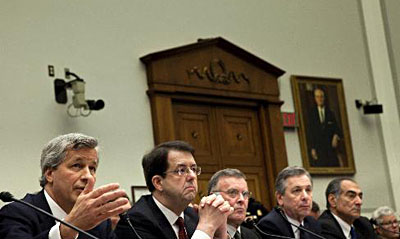 I think Edmund Andrews has a pretty solid take on the financial reform bill that passed the Senate last night:
I think Edmund Andrews has a pretty solid take on the financial reform bill that passed the Senate last night:
Before all the armchair pundits begin carping and tut-tutting, let us first appreciate how much the Senate bill actually does accomplish and how difficult it is to do anything at all when the full force of the financial industry is against you. Remember also that Dodd and the other Democrats had to contend with the hardball intransigence of the Republican Party, whose leaders tried to obstruct or gut just about every meaningful reform in the bill without proposing any of their own. This was not, repeat not, a philosphical disagreement between those who believe in the wisdom of government regulation and those who believe in the wisdom of free markets. However sincere Alabama’s Dick Shelby might be in his fear of overbearing government, this fight was about denying Demorats a “victory.” It was all straight from Mitch McConnell’s playbook for political success: just say no, no, a thousand times no — no matter how venal it makes you look.
Against that backdrop, it’s astonishing that the Senate bill actually became stronger as the process dragged on. The proposed consumer financial protection agency is stronger and I believe more independent than it would have been in the original Senate bill (more on that in a moment). The multi-trillion market in financial derivatives, which is almost unregulated right now, would for the most part have to be take place on exchanges or at least through clearinghouses — either of which require greater transparency and more upfront capital by the players. Banks, whose deposits are federally insured, would be prohibited from trading derivatives. And as an added surprise bonus, from none other that freshman Senator Al Franken, the bill includes a very smart reform to fix the corrupt busines model of credit-rating agencies.
I’d add Susan Collins’ amendment tightening bank capital standards to this list. If both her regs and the House’s 15:1 leverage limit survive the conference committee it will have a substantial effect on the way banks do business. It’s not the root-and-branch breakup of the banking system that Simon Johnson and James Kwak would like to see, but let’s face it: that was never anywhere within light years of getting support from 60 senators. Given what the realm of the possible included, I’d say that clearing derivatives, limiting leverage, regulating the ratings agencies, and creating a Consumer Finance Protection bureau are surprisingly strong responses to the financial crisis. What’s even more surprising is that the first three of these things got added as the bill progressed and the fourth got improved (I’ve come around to the view that putting the CFPB in the Fed is probably a good thing since it guarantees a stable funding source for its activities). Aside from some early losses over vanilla consumer products and reinstating a version of Glass-Steagall, the only thing that got seriously watered down was resolution authority — and frankly, I never thought resolution authority was a key part of the bill. I still don’t, and I suspect that it’s virtually never going to get used early enough to make a big difference. It’s obviously nice to have a clear legal regime for winding up a big failed bank once its failure is obvious, but that’s all we’re getting out of it.
In the end, this goes to show how strong a role public opinion can play in the legislative process. It’s obviously not always decisive, but in this case anti-bank sentiment was so strong that senators spent the past few months one-upping each other to introduce amendments that Wall Street hated. And the upcoming election, which normally makes serious legislating nearly impossible, actually made this legislation better. Celebrate this while you can because you’re not likely to see an election year make a bill better again in your lifetime.
All in all, not bad. Not as good as I hoped for, but better than I expected. Now let’s hope that Wall Street can be fended off just enough longer to get this thing through conference in decent shape. (Read Andy Kroll for more on that.) The fat lady hasn’t sung quite yet.















